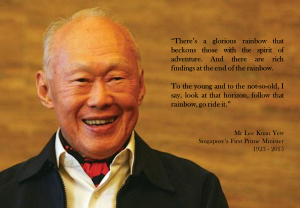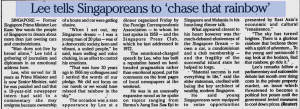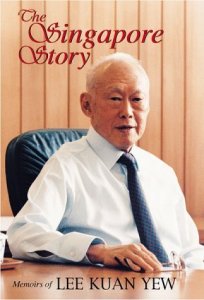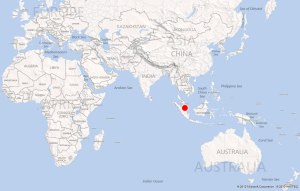
Published in the STRAITS TIMES on 31 Aug 2014
BY SUSAN LONG, SENIOR WRITER
He may be the group president of Singapore sovereign wealth fund GIC, but Mr Lim Siong Guan rides the MRT to work. He alights at Raffles Place, then walks about 20 minutes to GIC’s office in Robinson Road for the exercise.
If he needs a postage stamp or has any errand of a personal nature, he queues for it himself instead of bothering his secretary.
His yearly tour of GIC overseas offices since 2007 – four days around the world: Singapore, San Francisco, New York, London, Singapore; and another four days around Asia: Singapore, Mumbai, Tokyo, Seoul, Beijing, Shanghai, Singapore – is the stuff of corporate legend.
He does not book a single hotel room, sleeps on the plane, refuses a corporate limousine and insists on public transport. He lives out of a small carry-on bag and showers in GIC office gyms. The London office keeps a spare towel for him.
It is a practice the former chairman of the Economic Development Board says he picked up from his EDB days of city-hopping as “check-in luggage increases very significantly the chances of missing connecting flights”.
By all accounts, Mr Lim is an iconoclast. The former head of the Singapore civil service, who served as permanent secretary in the ministries of Defence, Education and Finance, and in the Prime Minister’s Office, is also a hard act to follow.
He sticks out in the financial sector because of his ascetic values, thrift and humility. He owns a Volvo S60, easily the smallest car among his colleagues.
While he won’t spend on hotel rooms, he’s prepared to spend a lot to effect organisational change. Everywhere he goes, he ignites a mini revolution, cutting red tape, operating close to the boundaries and bucking conventions.
Dr Teh Kok Peng, chairman of business space solutions provider Ascendas and formerly president of GIC Special Investments, says: “In the office, some call him ‘Superman’ for his drive, energy and nobility of intention. He demands a lot of himself so he’s in a position to demand a lot from others too.”
His pet phrase is: “Are we ready for the future?” His pet name is Yoda, for his wisdom, long-range thinking and fearlessness in challenging his staff to think, even ahead of their ministers.
He is also known as one of the toughest – because of his formidable intellect and unbending principle – yet nicest bosses to work for in the civil service. His top question to staff is always: “How can I help you do your job better?”
Stories abound of the small and big ways in which he intervened to help others. None of this, of course, will ever be disclosed by the wiry, reticent 67-year-old.
He minimises it all, ascribing it to his yearning for “simplicity” and to “experience what ordinary people have to experience”.
Next stop: Honour
Mr Lim might be onto his biggest change platform yet – trying to engineer social and behavioural change in Singapore by promoting a culture of honour. And the futurist has his work cut out for him.
Earlier this month, he founded and launched non-profit organisation Honour (Singapore), which was attacked online for its vagueness and suspected Christian agenda.
It’s easy to to see why as his diffidence makes him a tough interviewee.
He will not lament the deficiency of honour today, beyond saying it is latent in everyone, just not brought to the level of consciousness yet.
He is modest to a fault, not given to laying out bold plans or mission statements. He refuses, too, to make a big deal of honour – imbuing it with an everyday ubiquitous quality. He insists it’s not abstract but part of ordinary living here, such as people offering their seat on the MRT or a taxi driver arriving on time, as promised.
The only thing he is categorical about is that Honour (Singapore) has no right-wing Christian agenda. It has been taken to task online for not declaring that all five members of its board are part of Full Gospel Business (FGB) Singapore, an inter-denominational group of Christian professionals. Additionally, Honour (Singapore)’s executive director and board member Jason Wong is also chairman of Focus on the Family Singapore, a pro-family Christian charity.
For the record, Mr Lim states that Honour has no view on LGBT (lesbian, gay, bisexual, and transgender) issues. Neither is it an advocacy group for government policy, which it will not comment on.
After 37 years in the civil service, he says he understands the “extreme sensitivity” of race and religion. “Our intentions are very narrowly promoting a culture of honour and honouring. Clearly, Honour is not a Christian organisation. It can’t be if you’re trying to do something which has national value,” he says.
He adds that it would be impossible to advocate Christian work when it has a panel of 10 community advisers of differing religions, including Muslims and Buddhists, such as Haji Mohammad Alami Musa, president of the Islamic Religious Council of Singapore or Muis; Mr Chua Thian Poh, chairman of Ho Bee Land; and Ms Claire Chiang, senior vice-president of Banyan Tree Holdings.
But what about the worry expressed by netizens that his board’s overwhelming religious affiliation will lead to the imposition of Christian values of honour?
He says teachings like doing unto others as you would have them do unto you, honouring your parents and loving your neighbours are common to many religions. He cites humanitarian organisations started as an expression of faith such as Mercy Relief, started by Muslim group Perdaus in 2001, and St Andrew’s Mission Hospital, set up by the Anglican Church in 1913, which are now multiracial, multi-religious and secular in nature.
What about talk that Honour was set up at the behest of the Prime Minister to be a counter to the liberal tide out there and exemplify a more respectful response to the shrill voices out there?
Mr Lim seems affronted at this suggestion and says: “Absolutely not, he never spoke to me about it.”
As for the seeming haste to set up Honour, which led to it being registered under the same address as FGB, as well as to save costs, he says it is because the 50th year of Singapore’s Independence started on the 10th of August this year. “We thought that we ought to try to make it before the start of the 50th year,” he says, with his characteristic sense of urgency.
Use it or lose it
Honour (Singapore) is his practical-minded reaction to the treacly nostalgia of the SG50 celebrations, to mark Singapore’s 50th year of Independence next year.
Reading about the publicity on SG50, he felt it was overwhelmingly about celebration, honouring the pioneer generation and the past, which was good.
But he says: “The value of the past is to extract that which is critical that has brought us success, and to make sure that we don’t lose it as we think about the future.
“Every time people visit Singapore, we show them our Housing Board flats, CPF, education system, we talk about our strong leadership and political will – all of which are important. But if I were to ask myself, so what is the brand image of Singapore? What made us succeed? What is the defining characteristic of Singapore?
“It is trustworthiness. That’s why corporations plonk billions here and are prepared to wait 10 or 20 years to recover their investments. That’s why so many Singaporeans work in China as financial controllers and accountants, jobs which require total integrity and honesty.”
At the same time, he saw the fractious way public debates were being conducted here. So about four months ago, he rounded up a few friends to set up Honour (Singapore) to focus on the practice of honour – honouring our word and each other.
He believes this will help Singapore continue to succeed and stand out among nations. “Otherwise countries, like organisations, after a period of success, may end up with generations who are not aware or conscious about what has brought about that success,” he warns, adding that none of those invited to sit on his board or panel refused.
“If you look at the atlas of the world, Singapore fits within the letter ‘O’ of the name of the country. The reality is no one owes us a living. You matter if you succeed, you don’t matter if you fail.”
The closest thing he’s done to promote honour is introducing the concept of Total Defence in 1984, during his stint as permanent secretary at the Ministry of Defence.
That exercise was about getting people to think of defence beyond the hardware of military, civil and economic defence, to the softer factors of social defence and psychological defence, which “is about how people relate to each other and how people think about their home”.
“It’s very difficult to do something to bring about a new conviction in people. What you’re trying to do is take something already there and make it a conscious part of you,” he describes.
The difference today, he concedes, is that in his previous change-making roles, he was just doing his job. This is the first one he has given himself.
“Maybe it’s a reflection of my old age, a desire to do something while I can, before I fade from the scene,” lets on the author of the recent bestseller, The Leader, The Teacher & You. “I’ve got grandchildren, so I’m thinking about what kind of future I am leaving for them.”
He is also up against the fact that no such value-based organisation like Honour exists in the world as yet, hence all the speculations.
But he bids you judge it by what Honour (Singapore) will do. Right now, it runs a website with a weekly blog to inspire honouring behaviour. Soon, it will do talks on “leading, learning, loving and living with honour” and take part in conferences – by invitation only – in schools, businesses and community groups.
Mr Lim, who says he is on a year-to-year renewable contract with GIC and intends to stay only as long as he is “useful”, will kick off these talks himself. He will take leave from GIC to do so, just as he has conscientiously taken leave to do this three-hour interview with The Sunday Times.
Achieving transcendence
He was the eldest son of a taxi driver and teacher who got only two new sets of clothes a year – during Chinese New Year and at Christmas. Home was a rent-controlled compound house in Upper Serangoon shared with 20 other relatives.
His biggest thrill was when his father swung by in his taxi to pick him up from Paya Lebar Methodist Afternoon School. The bright boy, who transferred to Anglo-Chinese School at Primary 5, worked hard to attain the highest rank of Colour Sergeant with the Boys’ Brigade, struggling only with Chinese.
Whenever he or his three younger siblings failed in any endeavour, after putting in their best effort, his parents would take them out for a picnic. The value he caught was that: “The team that loses is the one that needs to be taken to McDonald’s, not the winners. They need to be encouraged to go down to the football pitch next week to fight again.”
He also learnt to treat everyone – regardless of station – with kindness. His mother had such a rapport with their Malay washerwoman, who lived in a nearby Malay kampung, that when the racial tensions broke out in the 1960s, she became their “guardian”.
A university education was beyond his family’s means. But he won the President’s Scholarship to study at the University of Adelaide and graduated with first class honours in mechanical engineering in 1969, which gave him his clear-eyed, problem-solving approach to life.
He started work here as a mechanical engineer at sewage treatment plants where he got his hands dirty. From 1978 to 1981, he was the first principal private secretary to then Prime Minister Lee Kuan Yew who, along with the late former deputy prime minister Goh Keng Swee, he considers his “master teachers”.
He then became permanent secretary at the Ministry of Defence from 1981 to 1994, where he raised the morale of the Singapore Armed Forces with a public campaign that positioned soldiers as defenders of the nation. From 1994 to 1998, as permanent secretary at the Prime Minister’s Office, then head of the civil service from 1999 to 2005, he championed the PS21 reformation, leading the public service to become more performance-driven, customer-focused, responsive to change and among the most admired in the world.
At the Ministry of Education (1997 to 1999), he was the architect of the “Thinking schools, learning nation” initiative. He introduced national education in schools and the President’s Award for Teachers to restore the honour traditionally accorded to them.
At the Ministry of Finance (1999 to 2006), he is credited for transforming the Government’s financial management system, promoting e-government and leading the ministry to reduce income tax rates and nhance Singapore’s tax competitiveness. He even introduced an award, called the ERRward, to recognise failure, a reflection of his belief that innovation involves experimentation and failures.
Upon his retirement in 2006, Prime Minister Lee Hsien Loong paid tribute to his “unbroken record of understanding Singapore’s challenges and developing a vision of how the public service should respond to these challenges”.
From 2006 to 2009, he went on to chair the EDB, then preside over GIC from 2007, where he continued his bruising momentum of change and organisational overhaul to help them meet the future. Dr Beh Swan Gin, Permanent Secretary at the Ministry of Law, remembers: “When he first came to EDB, officers asked him about his vision for EDB, and his reply was that he had no vision aside from making possible the collective vision of EDB officers. That answer was very empowering.”
Most of all, his staff – past and present – remember how he treats people, how he bothers to reply and thank by name the clerks who send out mass e-mail reports to the whole organisation.
They also hail him as an unstinting mentor with an openness of spirit to engage anyone – no matter how junior – and a consummate teacher whose homilies are peppered with children’s stories, song lyrics and poems.
Indeed, the change that Mr Lim is proudest of is what he has wrought in other peoples’ lives. The otherwise unforthcoming father of three grown children – a paediatric anaesthetist, civil servant and branding consultant – and grandfather of five pipes up: “I know what makes me feel happy – when people tell me that I helped them realise their potential in some way. To me, leadership is about transcendence, it is about what do you do for other people.”
This could be why his past and present staff remain fiercely loyal.
Mr Yeoh Keat Chuan, managing director of EDB, counts him as one of the “most selfless” leaders he has ever known. “He is always willing to give up his personal time to help others even though I know he would dearly like to spend more time with his grandchildren.”
Accountant-General Chua Geok Wah, who witnessed the transformation of the civil service under Mr Lim, sums up her tribute to him by quoting ancient Chinese philosopher Lao Tzu.
“A leader is best when people barely know he exists, when his work is done, his aim fulfilled, they will say, ‘we did it ourselves’.”
BACKGROUND STORY
Why call it Honour?
“I was asked why don’t we call it Trust or Respect, which are easier to understand and have less ambiguity. But it would have lost a very important point about ‘honour’. Honour is something we offer unconditionally on our own initiative, whereas trust or respect is our reaction to someone who behaves in a way that makes us believe in him or her.”
His motivation
“All my motivation for change has really been about the future. If you don’t change, are you good enough for the future? That’s the real driver. SG50 is about the past, we have to think about the future. What does the future need? Two things. One is, we need to continue to be a people whose word is our honour. Second, we also need to develop as a people who know how to live with a diversity of views and from all that diversity come to good conclusions as to how we move our way forward.”
suelong@sph.com.sg

![[FIRST - 8] ST/PRIME/PAGE ... 25/08/16](https://winningwithhonour.files.wordpress.com/2016/08/winning-with-honour-l-tributes-to-mr-nathan-published-in-the-straits-times-on-25-august-2016-2.jpg)
![[FIRST - 8] ST/PRIME/PAGE ... 25/08/16](https://winningwithhonour.files.wordpress.com/2016/08/winning-with-honour-l-tributes-to-mr-nathan-published-in-the-straits-times-on-25-august-2016-1.jpg)














